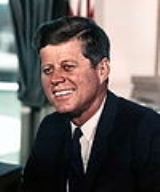
1943 World War II: the Motor Torpedo Boat PT-109 is rammed by the Japanese destroyer ''Amagiri'' and sinks. Lt. John F. Kennedy, future U.S. President, saves all but two of his crew.
1960 In Chicago, the first televised debate takes place between presidential candidates Richard M. Nixon and John F. Kennedy.
1960 While campaigning for President of the United States, John F. Kennedy announces his idea of the Peace Corps.
1960 Robert McNamara is named president of Ford Motor Co., the first non-Ford to serve in that post. A month later, he quit to join the newly-elected John F. Kennedy administration.
1960 Richard Paul Pavlick is arrested for attempting to blow up and assassinate the U.S. President-Elect, John F. Kennedy only four days earlier.
1961 John F. Kennedy is inaugurated as the youngest elected and first Roman Catholic President of the U.S. His inaugural address is one of the most memorable of the 20th century.
1961 In Washington, D.C. John F. Kennedy delivers the first live presidential television news conference.
1961 John F. Kennedy appoints Janet G. Travell to be his physician. This is the first time a woman holds this appointment.
1961 President of the United States John F. Kennedy establishes the Peace Corps.
1961 Apollo program: U.S. President John F. Kennedy announces before a special joint session of the Congress his goal to initiate a project to put a "man on the Moon" before the end of the decade.
1961 In a speech John F. Kennedy emphasizes that any attack on Berlin is an attack on NATO.
1962 Lyman Lemnitzer, chairman of the Joint Chiefs of Staff, delivers a proposal, called Operation Northwoods, regarding performing terrorist attacks upon Guantánamo Bay Naval Base, to Secretary of Defense Robert McNamara. The proposal is scrapped and President John F. Kennedy removes Lemnitzer from his position.
1962 A birthday salute to U.S. President John F. Kennedy takes place at Madison Square Garden, New York City. The highlight is Marilyn Monroe's rendition of ''Happy Birthday''.
1962 Cuban Missile Crisis: US President John F. Kennedy, after internal counsel from Dwight D. Eisenhower, announces that American reconnaissance planes have discovered Soviet nuclear weapons in Cuba, and that he has ordered a naval "quarantine" of the Communist nation.
1962 President John F. Kennedy dedicates Dulles International Airport, serving the Washington, D.C. region.
1962 Cuban Missile Crisis ends: In response to the Soviet Union agreeing to remove its missiles from Cuba, U.S. President John F. Kennedy ends the quarantine of the Caribbean nation.
1962 Vietnam War: After a trip to Vietnam at the request of US President John F. Kennedy, US Senate Majority Leader Mike Mansfield becomes the first American official not to make an optimistic public comment on the war's progress.
1963 Travel, financial and commercial transactions by United States citizens to Cuba are made illegal by the John F. Kennedy administration.
1963 John F. Kennedy signs the ratification of the Partial Test Ban Treaty.
1963 In Dallas, Texas, US President John F. Kennedy is killed and Texas Governor John B. Connally is seriously wounded by Lee Harvey Oswald, who is later captured and charged with the murder of police officer J. D. Tippit. That same day, US Vice-President Lyndon B. Johnson is sworn in as the 36th President of the United States.
1963 President John F. Kennedy is buried at Arlington National Cemetery.
1963 U.S. President Lyndon B. Johnson establishes the Warren Commission to investigate the assassination of President John F. Kennedy.
1964 A jury in Dallas, Texas, finds Jack Ruby guilty of killing Lee Harvey Oswald, assumed assassin of John F. Kennedy.
1964 The Warren Commission releases its report, concluding that Lee Harvey Oswald, acting alone, assassinated President John F. Kennedy.
1967 The body of President John F. Kennedy is moved to a permanent burial place at Arlington National Cemetery.
1979 The John F. Kennedy library is opened in Boston, Massachusetts.

